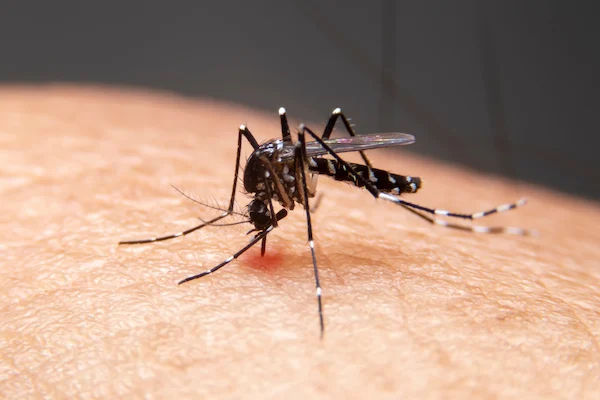Dengue Causes and Symptoms: Prevention, Diagnosis, and Treatment
Learn about dengue causes, symptoms, and prevention strategies. Discover diagnosis methods, treatment options, and how to protect yourself from mosquito-borne infections.

Written by Dr.Sonia Bhatt
Last updated on 3rd Jul, 2025

Introduction
Dengue is a mosquito-borne viral infection that affects millions of people worldwide. It is caused by the dengue virus (DENV) which belongs to the Flavivirus family. When an infected mosquito bites you, the virus enters your bloodstream, begins to replicate, and causes symptoms. The virus is transmitted by Aedes mosquitoes. The viral infection causes flu-like symptoms and, in severe cases, can become life-threatening.
In over 100 countries across the globe, dengue is a major public health concern. According to the World Health Organization (WHO), an estimated 50–100 million dengue infections occur annually, with severe outbreaks causing hospitalisations and deaths. If you live in or travel to areas where dengue is prevalent, taking preventive measures can reduce your risk of infection. Moreover, understanding the causes and symptoms of dengue can help you take the right precautions and seek medical care if needed.
Causes of Dengue
Dengue is caused by a virus that spreads through mosquito bites. Once a person is infected, the virus multiplies in the bloodstream, triggering symptoms that range from mild fever to severe complications. Since there is no direct treatment for dengue, understanding its causes can help you take preventive measures.
Dengue Virus and Its Strains: Dengue is caused by the dengue virus (DENV), which belongs to the Flavivirus family. There are four distinct strains (DENV-1, DENV-2, DENV-3, and DENV-4). If you are infected with one strain, you develop immunity to that specific type but remain vulnerable to the other three. A second infection with a different strain increases the risk of severe complications, such as dengue haemorrhagic fever or dengue shock syndrome.
Transmission by Mosquitoes: Dengue spreads through the bite of infected Aedes aegypti and Aedes albopictus mosquitoes. When a mosquito bites an infected person, it carries the virus and transmits it to the next person it bites. These mosquitoes breed in stagnant water and bite mostly during the early morning and late afternoon. Reducing mosquito populations and avoiding bites are key to preventing the spread of dengue.
Risk Factors for Dengue
Several factors increase your risk of contracting dengue. Your location, climate conditions, and individual health play a role in determining how likely you are to be infected.
Dengue is more common in tropical and subtropical regions where warm temperatures and high humidity allow mosquitoes to thrive. India and other countries in Asia, South America, Africa, and the Pacific Islands experience frequent outbreaks, especially during the rainy season when stagnant water collects in open containers, drains, and puddles, providing breeding grounds for mosquitoes. Urban areas with poor sanitation and overcrowding further increase the risk of dengue transmission.
Certain individuals are more vulnerable to severe dengue infections. You may be at higher risk if you:
Have a weakened immune system due to a medical condition
Have had a previous dengue infection, increasing the likelihood of severe symptoms upon reinfection
Spend a lot of time outdoors in high-risk areas without protection
Are pregnant, as the virus can, in rare cases, be transmitted from mother to baby
If you fall into any of these categories, taking extra precautions can help you avoid infection and its complications.
Symptoms of Dengue
Dengue symptoms vary depending on the severity of the infection. In the early stages, the disease may seem like a regular viral fever, but in some cases, it can progress to severe complications. Recognising the warning signs early can help you seek timely medical attention.
1. Common Symptoms in Early Stages
Mild dengue often presents flu-like symptoms that appear four to ten days after being bitten by an infected mosquito. Early symptoms include:
High fever (up to 40°C)
Severe headache and pain behind the eyes
Muscle and joint pain, often referred to as "breakbone fever"
Nausea, vomiting, and loss of appetite
Skin rashes that may appear a few days after the fever begins
2. Severe Symptoms and Complications
In some cases, dengue can progress to a more severe form known as dengue haemorrhagic fever or dengue shock syndrome. These conditions require immediate medical attention. Warning signs include:
Persistent vomiting and severe abdominal pain
Bleeding from the gums, nose, or under the skin (bruising)
Difficulty breathing due to fluid accumulation in the lungs
Low blood pressure leading to shock
If you or someone around you shows severe symptoms, seeking urgent medical care can prevent life-threatening complications.
Diagnosis of Dengue
If you experience symptoms like high fever, body aches, and skin rashes, getting tested for dengue is crucial. Early diagnosis helps in managing symptoms effectively and preventing severe complications. Doctors use clinical evaluation and laboratory tests to confirm the presence of the dengue virus.
Your doctor will assess your symptoms and medical history to determine the likelihood of dengue infection. A physical examination checks for common signs such as high fever, eye pain, muscle aches, and skin rashes. If you have recently travelled to a dengue-prone area or been exposed to mosquito bites, your doctor may suspect dengue and recommend further tests.
To confirm dengue, laboratory tests are performed. The most common tests include:
Dengue NS1 Antigen Test – Detects the virus in the early stages.
Dengue IgM and IgG Antibody Tests – Identify the presence of antibodies, indicating a recent or past infection.
Complete Blood Count (CBC) – Checks for low platelet count and white blood cell levels, which are common in dengue cases.
Early diagnosis ensures timely management, reducing the risk of severe complications.
Get Tested for Dengue
Treatment for Dengue
There is no specific antiviral treatment for dengue, but managing symptoms and providing supportive care can help with recovery. In severe cases, hospitalisation may be required to prevent complications.
1. Managing Symptoms
If you have mild dengue, treatment focuses on relieving symptoms and preventing dehydration. Some key management strategies include:
Staying hydrated by drinking plenty of fluids to replace lost electrolytes.
Taking paracetamol to reduce fever and pain (avoiding aspirin and ibuprofen, as they may increase bleeding risk).
Getting enough rest to allow your immune system to fight the virus.
With proper care, most mild cases of dengue resolve within one to two weeks.
2. Medical Interventions in Severe Cases
Severe dengue requires hospital treatment to prevent complications. If your condition worsens, medical interventions may include:
Intravenous (IV) fluids to treat dehydration.
Blood transfusions in cases of severe bleeding due to low platelet levels.
Oxygen therapy and intensive care for patients with respiratory distress or organ failure.
Seeking medical attention at the first sign of severe symptoms can save lives and reduce the risk of long-term effects.
Prevention and Control
Preventing dengue requires both mosquito control efforts and personal protection. Since there is no cure for dengue, reducing mosquito populations and avoiding bites are the most effective ways to protect yourself and your community.
1. Mosquito Control Measures
Reducing mosquito breeding sites can help prevent the spread of dengue. Effective control methods include:
Eliminating stagnant water from flower pots, tyres, and containers where mosquitoes breed.
Using insecticides and larvicides in areas with high mosquito activity.
Encouraging community efforts such as fogging and spraying to reduce mosquito populations.
2. Personal Preventive Strategies
Taking personal precautions can lower your risk of mosquito bites. To protect yourself, you should:
Wear long-sleeved clothing to minimise skin exposure.
Use mosquito repellents containing DEET or natural alternatives like citronella.
Install mosquito nets or screens at home to prevent bites.
Avoid outdoor activities during peak mosquito hours (early morning and late evening).
By following these preventive strategies, you can significantly reduce your chances of contracting dengue.
Prognosis and Recovery
Recovering from dengue depends on the severity of the infection and how well symptoms are managed. Most people with mild dengue recover within a few weeks, while severe cases may require longer medical supervision. Ensuring proper rest and hydration can speed up recovery and prevent complications.
Typical Recovery Timeline: If you have mild dengue, you may start feeling better within one to two weeks. The fever usually lasts five to seven days, followed by weakness and fatigue that can persist for several days. Proper hydration and symptom management help in a smooth recovery. In severe dengue, hospitalisation may be required, and full recovery can take several weeks to months, depending on complications such as internal bleeding or organ involvement.
Potential Long-Term Effects: While most people recover fully, some individuals experience lingering effects. Post-viral fatigue, muscle pain, and weakness can last for weeks. In rare cases, severe dengue may cause lasting damage to organs, particularly the liver and heart. Repeated dengue infections increase the risk of severe complications, making prevention crucial. Monitoring your health even after recovery ensures a smoother transition back to normal activities.
Conclusion
Dengue is a mosquito-borne viral infection that spreads through the bite of Aedes mosquitoes. The disease is common in tropical and subtropical regions and can cause flu-like symptoms, including high fever, muscle pain, headaches, and skin rashes. In severe cases, dengue can lead to bleeding, organ failure, or dengue shock syndrome. Recognising the early signs and seeking prompt medical care can help you prevent serious complications.
Preventing dengue involves avoiding mosquito bites and controlling mosquito breeding grounds. Using insect repellents, wearing protective clothing, and eliminating stagnant water can significantly reduce your risk of infection. If you live in or travel to high-risk areas, being aware of symptoms and getting diagnosed early can help with effective treatment. Prioritising dengue prevention protects not only your health but also the well-being of your community.
Consult Top General Physicians
Consult Top General Physicians

Dr. M L Ezhilarasan
General Practitioner
6 Years • MBBS
Visakhapatnam
Apollo 24|7 Clinic - Andhra Pradesh, Visakhapatnam

Dr D M Karthik
General Practitioner
4 Years • MBBS, Fellowship in Diabetes Mellitus, Advance certificate in Diabetes Mellitus, Derma Nutrition Certification
Visakhapatnam
Apollo 24|7 Clinic - Andhra Pradesh, Visakhapatnam

Dr. D Bhanu Prakash
General Practitioner
10 Years • MBBS, AFIH, Advanced certificate in critical care medicine, Fellowship in critical care medicine
Hyderabad
Apollo 24|7 Clinic, Hyderabad

Dr. Suraja Nutulapati
General Physician/ Internal Medicine Specialist
10 Years • MBBS, MD (Internal Medicine)
Hyderabad
Apollo 24|7 Clinic, Hyderabad
(850+ Patients)

Dr. Siri Nallapu
General Practitioner
5 Years • MBBS
Hyderabad
Apollo 24|7 Clinic, Hyderabad